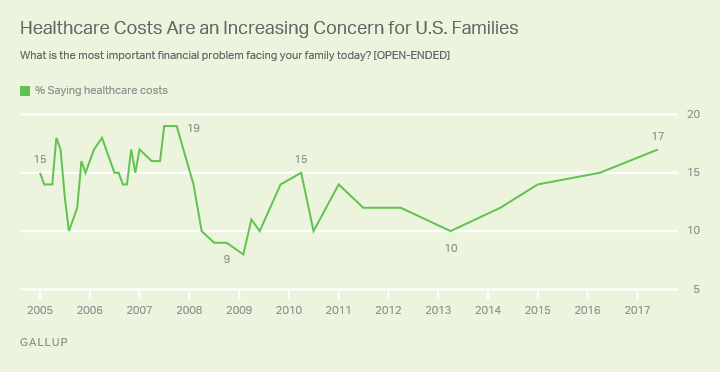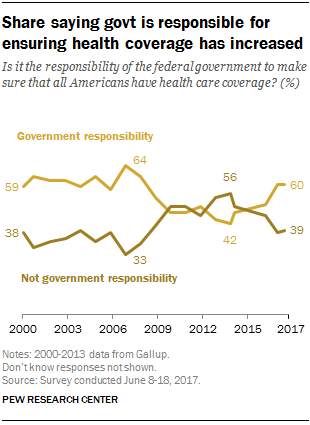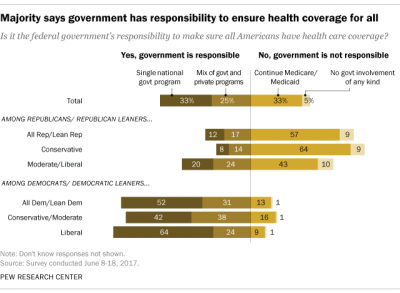 Americans are most worried about healthcare costs among all financial concerns; most people in the U.S. also believe the Federal government should ensure that all people have health coverage.
Americans are most worried about healthcare costs among all financial concerns; most people in the U.S. also believe the Federal government should ensure that all people have health coverage.
Two polls published in the past week point to the fact that most U.S. health citizens are concerned about health care for themselves and their families, driving a growing proportion of people to favor a single-payer health system.
The first line chart illustrates a dramatic trajectory up of the number of American identifying healthcare costs as their #1 financial problem, rising from 10% of people in 2013 to 17% in 2017. Note this proportion nearly reaches the 19% of public concern for healthcare costs in 2007 just before the Great Recession hit, the Gallup Poll found. Gallup surveyed 1,009 U.S. adults over 18 the week of June 7, 2017.
The relative low of 10% of people most concerned about healthcare costs was felt in 2013 as people grew more confident in health security: the Affordable Care Act was being implemented, and 2013 was a significant year of Medicaid expansion, with health insurance exchanges taking effect on January 1, 2014.
The poll found that, after healthcare cost concerns, the most important financial problems families in the U.S. face today are:
- Too much debt, and not enough money to pay those debts, 11%
- Lack of money, low wages, 10%
- College expenses, 10%
- Cost of owning/renting a home, 9%
- High cost of living, 8%
- Retirement savings, 6%
- Taxes, 5%.
 Most Americans believe that the government is responsible to ensure health coverage for everyone in the nation, according to a poll from Pew Research Group conducted about the same time as the Gallup Poll in early June 2017.
Most Americans believe that the government is responsible to ensure health coverage for everyone in the nation, according to a poll from Pew Research Group conducted about the same time as the Gallup Poll in early June 2017.
Most Americans believe that the Federal government is responsible for ensuring that all Americans have health care coverage, according to a new poll from the Pew Research Center conducted between June 8 and 18. This represents an increase of 18 percentage points over the 2013 support, and approaches the largest percent for Federal government healthcare support seen back in Pew’s survey from 2006.
Over 33% of Americans, across all political parties, support a single payer health plan for the United States, up 5 percentage points since January 2017.
Support for single payer healthcare varies by political ID: 52% of Democrats support a single payer plan and 12% of Republicans, in this poll. The proportion of Democrats supporting a single payer plan grew 9 percentage points since January 2017 and 19 percentage points since 2014.
While only 1 in 10 Republicans support a single national health plan, 57% of Republicans still support the Federal government sponsoring Medicare and Medicaid for seniors and the poor, Pew’s research found.
Age is a predictor for single-payer support: nearly one-half (45%) of America’s youngest voters, ages 18 to 29, support a national single payer health plan.
 Health Populi’s Hot Points: Today is Financial Health Matters Day, a project of the Center for Financial Services Innovation (CFSI). Clearly, healthcare financial health matters to Americans, which underpins a growing sense of healthcare insecurity in America.
Health Populi’s Hot Points: Today is Financial Health Matters Day, a project of the Center for Financial Services Innovation (CFSI). Clearly, healthcare financial health matters to Americans, which underpins a growing sense of healthcare insecurity in America.
The sentiment is expressing itself in the number of people in the U.S. supporting a single-payer healthcare system, noted by the Pew survey.
The CBO scoring of the Better Care Reconciliation Act of 2017 (that is, the Senate’s version of the House’s American Health Care Act, AHCA) suggests that financial un-wellness would grow among American health citizens were the BCRA to pass in its current form. Senator Susan Collins of Maine expressed her intended “no” vote for the BCRA, saying that, “This bill doesn’t come close to achieving the goal of allowing low-income seniors to purchase health insurance….We don’t want to in any way sacrifice coverage for people who need it the most.” And, last week, Moody’s, the credit rating agency, calculated that BCRA would lead to financial unwellness for hospitals and other healthcare sectors, as well.
Follow Financial Health Matters Day on Twitter using hashtag #FinHealthMatters.




 Interviewed live on BNN Bloomberg (Canada) on the market for GLP-1 drugs for weight loss and their impact on both the health care system and consumer goods and services -- notably, food, nutrition, retail health, gyms, and other sectors.
Interviewed live on BNN Bloomberg (Canada) on the market for GLP-1 drugs for weight loss and their impact on both the health care system and consumer goods and services -- notably, food, nutrition, retail health, gyms, and other sectors. Thank you, Feedspot, for
Thank you, Feedspot, for  As you may know, I have been splitting work- and living-time between the U.S. and the E.U., most recently living in and working from Brussels. In the month of September 2024, I'll be splitting time between London and other parts of the U.K., and Italy where I'll be working with clients on consumer health, self-care and home care focused on food-as-medicine, digital health, business and scenario planning for the future...
As you may know, I have been splitting work- and living-time between the U.S. and the E.U., most recently living in and working from Brussels. In the month of September 2024, I'll be splitting time between London and other parts of the U.K., and Italy where I'll be working with clients on consumer health, self-care and home care focused on food-as-medicine, digital health, business and scenario planning for the future...